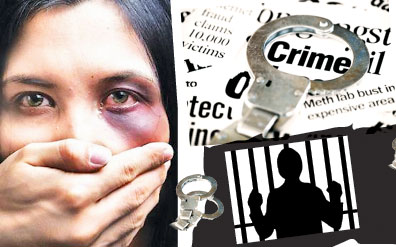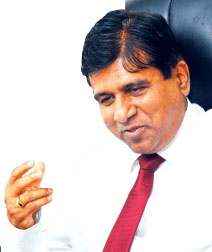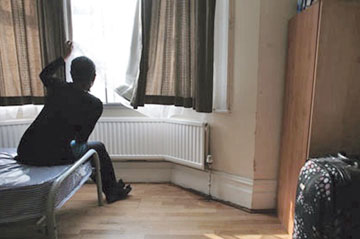National Authority for the protection of Roping in the culprits
by Dhaneshi Yatawara
A new Authority is to be set up soon to give effect to the newly
introduced Witness Protection Law, Justice Minister Wijeyadasa
Rajapakshe said.
 |
|
Pic: Times of Malta |
A separate Authority will soon be set up under the Justice Ministry.
"The Authority is vested with powers to ensure that the Act will be
implemented in the correct manner. It is now legal and is just a matter
of implementing it" Justice Minister Wijeyadasa Rajapakshe said.
The Act titled , ‘Assistance to and Protection of Victims of Crime
and Witnesses Act’ did not bring justice to Sri Lankans. As many argued
and agreed it was the most important missing link in the local legal
framework.
"This is the first time an Act was passed in our Legislature,
addressing issues related to victims and witnesses though we had
numerous enactments to deal with crimes and offenders," the Minister
said.
The Act, in keeping with the Lessons Learned and Reconciliation
Commission (LRRC) recommendations has been hailed by local and
international human rights activists and concerned parties.
Delay
With much pressure from the legal community and human rights
activists ‘The Assistance to and Protection of Victims of Crime and
Witnesses Bill’ was drafted and it took more than a decade to be
enacted.
"When the world was enlightened enough to protect witnesses and
victims as a basic human right, why couldn't the Sri Lankan government
give such assurance to its citizens? If there was sufficient political
will of the previous government the Bill could have been enacted", said
Minister Rajapakshe. "Being in the Opposition, we raised our voice,
highlighting the importance of enacting the Bill,"he added.
 |
|
Justice Minister Wijeyadasa
Rajapakshe
Pic: Susantha Wijegunasekera |
The initiative of the Draft Bill originally came from the late
S.S.Wijeratne of the National Centre for Victims of Crime. The Law
Commission was asked in 2000 to prepare draft legislation on victim and
witness assistance and protection which it did and forwarded to the
Ministry of Justice. However, the draft stalled.
In 2005, the Law Commission was once again asked to prepare a Draft
Bill. The final Draft Bill was forwarded to the Ministry of Justice and
Law Reform in late July 2007. A Witness Protection Act was suggested to
Sri Lanka by the International Independent Group of Eminent Persons (IIGEP)
chaired by Justice P N Bhagwati of India.
The IIGEP had overseen the work of the Presidential Commission of
Inquiry headed by retired Supreme Court Judge Nissanka Udalagama which
investigated some serious human rights violations in 2005-2006.
"It is in our common domain that our criminal justice failed to a
large extent. According to records of the recent past, on an average
only 4% of the court cases where suspects were found guilty. The rest
got away. That was the trend. One of the main reasons was the difficulty
in bringing witnesses to reveal the truth. In criminal cases there was a
lot of pressure, intimidation, influence, gratifications where witnesses
and victims were concerned.
Most criminals who resorted to crime knew how to prevent true
evidence from reaching the Courts," Minister Rajapakshe said.
A lack of witness protection drew international concern with the
cases of missing and disappearance of people. A lack of a witness
protection system was one of the main allegations levelled against Sri
Lanka during UN Human Rights Council Sessions in Geneva.
Navaneethem Pillay, when she was the United Nations High Commissioner
for Human Rights first questioned the absence of a witness protection
system during her visit to Sri Lanka, as a result it was of grave
concern not only domestically but internationally too," he added.
New terms
 |
|
Pic: The Guardian |
When the Draft Bill was presented to the Supreme Court, it was
challenged in the Supreme Court claiming that it was against Article 121
(1) of the Constitution. The constitutional conflict was cleared
later."The Supreme Court suggested some amendments to the Bill. We made
the necessary adjustments and made the enactment possible" he explained.
The Act, envisages the setting up of a National Authority for the
protection of victims of crime and witnesses, a Board of Management, a
Protection Division in the Lankan police and a high level Advisory
Council.
Among those involved in the National Authority will be experts in
criminology, nominees of the Attorney General, the Inspector General of
Police, and the Minister of Justice. The Advisory Board will comprise
the Chief Justice, the Attorney General, the President of the Bar
Association, Social activists, and the Inspector General of Police.
There will be compensation for victims of crime and also a fund to aid
witnesses and victims. Under the provisions of the Act, a victim or
witness of crime will have the right to be treated with equality,
fairness and with respect for his dignity and privacy.
The Tamil National Alliance has gone on record saying that the law
should be implemented in letter and in spirit.
"The amendments made no substantial changes to the Act. Only
technical matters were dealt with. The objectives are intact", said the
Minister.
|

